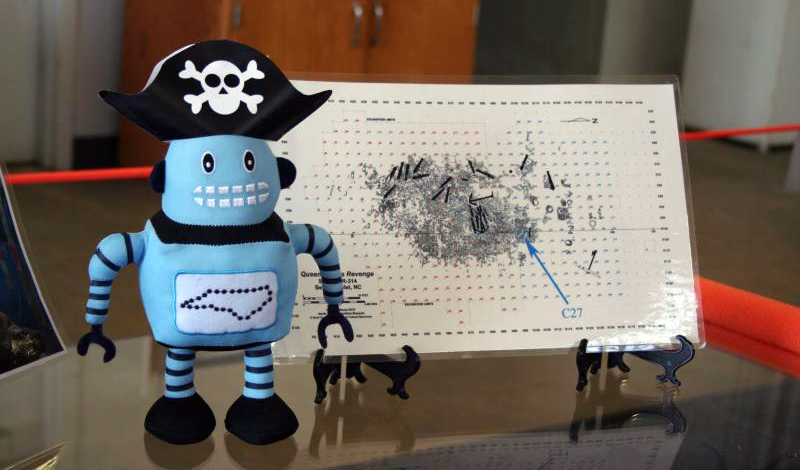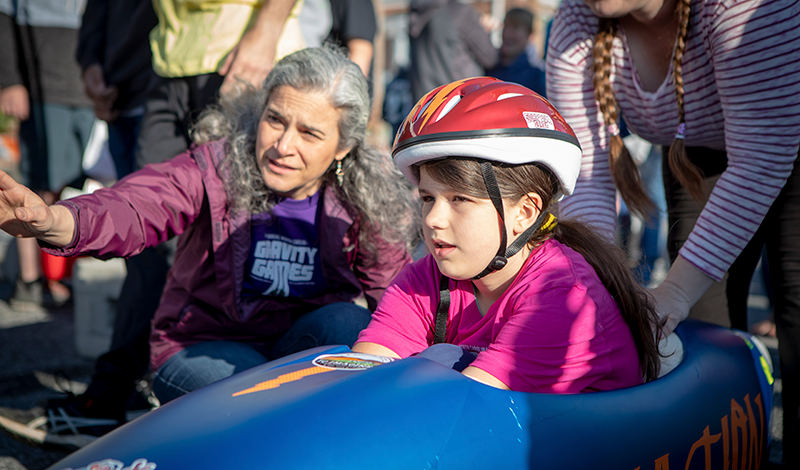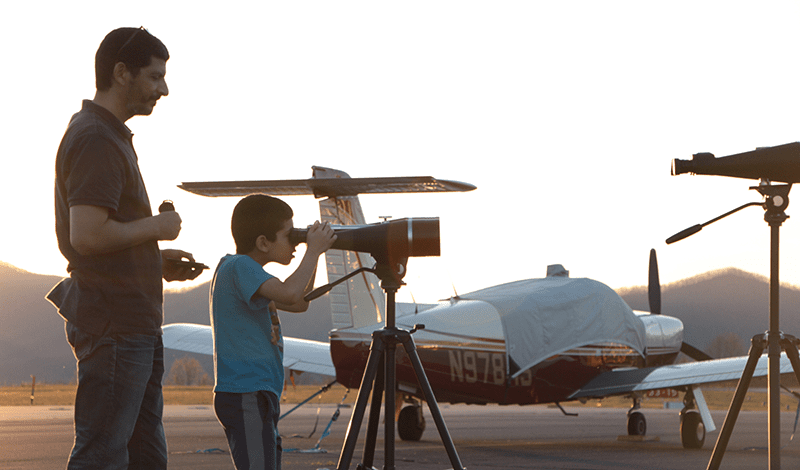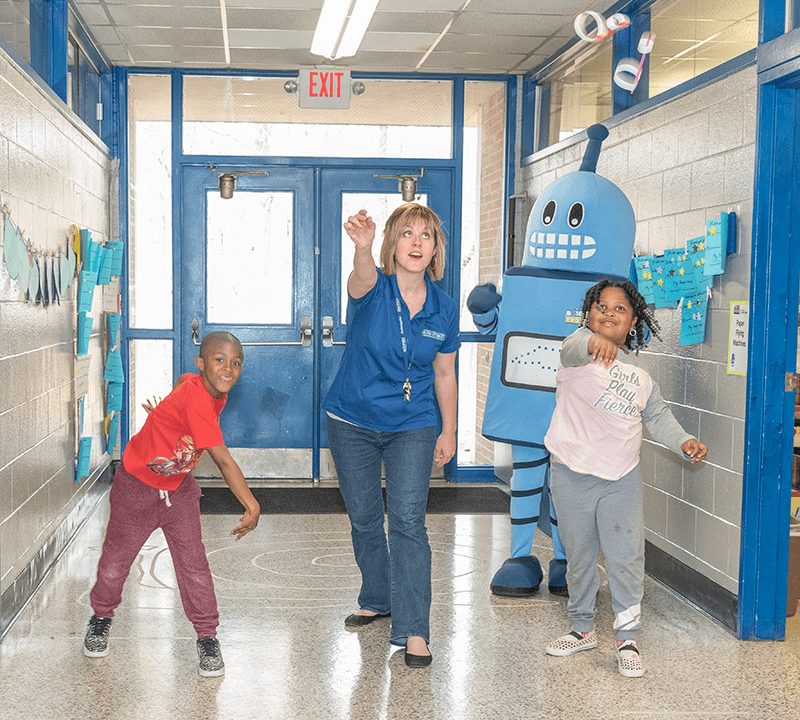
NC Science Festival Has Become the State’s Hot Ticket
There’s a reason Kelvin is the robotic ambassador for the NC Science Festival: with its tubular arms and legs, a gaze frozen in wide-eyed amazement, and a bemused grimace, Kelvin is simply adorable. Kids love Kelvin. Probably most parents do too, even if they’re reluctant to admit it.
Intentional or not, Kelvin is also an appropriate metaphor for a festival designed to stimulate interest in all things STEM (science, technology, engineering, and mathematics) across the state.
A kelvin is a unit of measurement used in the International System of Units to gage changes in temperature. In scientific terms, an increase in kelvins is an increase in thermodynamic energy. As kelvins go up, that’s a sign that molecules are on the move! And, as Kelvin the Spokesbot makes more and more appearances across the state, that’s a sign that North Carolina’s enthusiasm for STEM is heating up.

Festival organizers hope to make the 2020 festival in April the hottest ever. In this effort, they are currently accepting proposals from constituent institutions for the UNC System Challenge Grant and from non-affiliated organizations to fund the STEM engagement activities that will energize this year’s festival.
Putting Science in Every Corner
2020 will mark the festival’s 10th anniversary. In its inaugural year, 85,860 participants attended 413 events. Nine years later, the 2019 festival attracted 451,537 participants to 800 events.
By some estimations, these numbers make the NC Science Festival the largest science festival in the world in terms of total reach. The festival’s scope is critical to its mission to bring science to everyone. Festival organizers prioritize reaching rural populations, so that all North Carolinians—not just those near major metropolitan centers—have access to and get inspired by the wonders of STEM.
“One of the great things about the festival is that it allows the people of North Carolina to get access to scientists, scientific research, and unique science-oriented experiences that they wouldn’t otherwise have access to. Whether it’s giving students an opportunity to visit a research lab or to meet an astronaut, the festival is really all about connecting students with STEM professionals,” explained Erik MacIntosh, the festival’s programs manager.
Last year the festival inspired kids of all ages in 96 counties. From Gates County in the northeast to Macon county in the western stretch, participants were doing everything from studying the stars and testing chemical reactions, to designing Lego robots and learning to program.


A State-wide Festival, a System-wide Effort
Morehead Planetarium and Science Center at UNC-Chapel Hill produces this ambitious annual undertaking. But organizers utilize the innovation and STEM expertise at UNC System institutions to extend the festival’s reach well beyond the Triangle. Last year, 4,068 STEM professionals contributed their efforts.
This year, organizers want the festival to be even bigger, and they are encouraging faculty and staff at every UNC System institution to submit proposals for grants of up to $5,000 to help fund community events that showcase the exciting STEM teaching and research taking place throughout the state.
Last year UNC Challenge Awards funded 13 events at nine institutions. These activities alone reached 15,491 participants, who interacted with faculty, grad students, and undergraduate scientists. The average scientist-to-attendee ratio across all NCSF events was 1:34. For the UNC System events, that ratio was 1:24.
In 2019, all 13 events that received a UNC Challenge Grant were free, making it easier for under-resourced populations to participate in educational activities on university campuses.
“I really look forward to the event each year because it makes my heart shine! I cannot express
to you how much it means to our community members with disabilities. They don’t get this kind of opportunity. The kids shouted, ‘Best day ever!’ when they left,” said Dr. Amy Moody following UNC Wilmington’s ChangeMakers event, which provided opportunities for children with special needs to get hands-on experience with maker technology.
The potential life-changing impact of this exposure is significant. No doubt, for many participants, attending an NC Science Festival event will prove to be the first step down a pathway that is already winding its way to a fulfilling STEM education and career.
“The impact is almost immeasurable. They were excited, enticed, and engaged as they participated in the free hands-on STEM stations with their parents, siblings, classmates, and their teachers,” said Eustacia Lowry-Jones, a teacher at Union Chapel Elementary in Pembroke, following one of the festival’s Duke Science Night events. “What really speaks volumes is that our students are finally grasping the idea that their job in the future could be a STEM-based career….the possibilities are limitless!”

From Flat to Fully Realized
Kelvin is easily the most popular member of the NC Science Festival staff, but its compatriots hardly seem envious. No one seems immune to its charms.
Kelvin has been travelling North Carolina’s by-ways and highways for nine years. The spokespot began the journey as a “Flat-Stanley”-styled, two-dimensional figure, popping up in photobombs throughout the state. It didn’t take long for Kelvin to become a three-dimensional figure capable of interacting with kids in a variety of ways.
Like its robotic ambassador, the NC Science Festival has quickly transformed itself. After 10 years, the nation’s first state-wide science festival has become an institution.
Last year, Kelvin travelled 2,104 miles, to and fro across North Carolina. It’s tough travelling being the spokesbot for a festival that reaches virtually every corner of the state. But Kelvin would be the first to confess that life on the road is an adventure. Next year, it hopes to log even more miles.